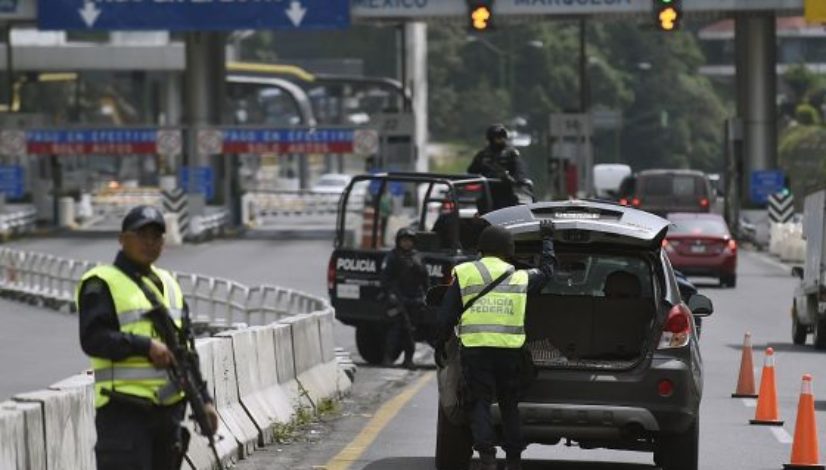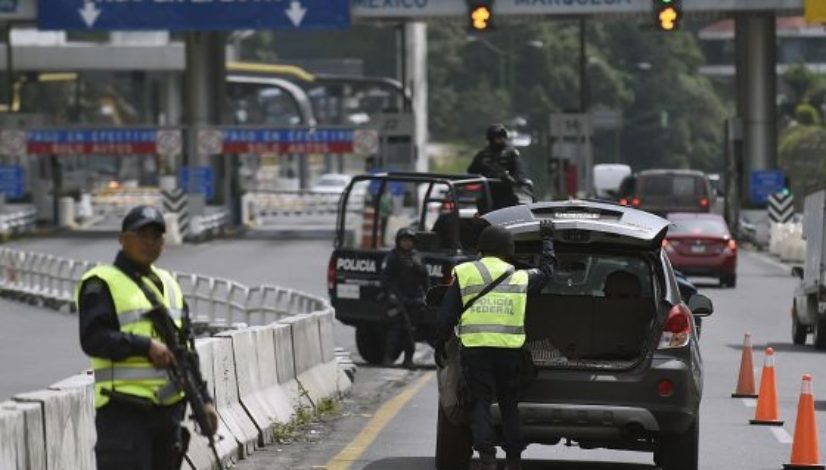Kidnapped man about to be traded for 30 lbs of marijuana escapes car trunk at Mexican border

Published: Nov 27, 2017, 10:46 am • Updated: Nov 27, 2017, 10:46 am
By Kyle Swenson, The Washington Post
As the white sedan rolled through the border, officially passing from the United States into Mexico at the Naco Port of Entry in Arizona, the car’s trunk thumped open and a man struggled out.
Handcuffed and duct-taped, still twitching from repeated cattle prod zaps, he bolted for Mexican customs officials. He had been kidnapped, he claimed. The white sedan drove on to a prearranged meeting 600 meters from the crossing.
As officials began investigating, they realized the victim, identified in court records as “A.G.” or by his nickname, “Ghost,” had a drug cartel bounty on his head, according to federal court records. The 54-year-old woman behind the sedan’s wheel – Roxanne “Rocky” Marie Carpenter – was planning to turn him over for 30 pounds of marijuana.
So began one of the stranger borderland tales of the last year, a criminal saga of a shaky kidnapping plot masterminded by drug users caught up in the underground economy piping illegal narcotics between Mexico and the U.S. In court filings, attorneys for Carpenter argued that the defendant and her three co-defendants – Phoelix “Lokie” Begay, Fausto “Zombie” Velazquez and Brian Edward Meyers – were far from criminal players but “overwrought methamphetamine enthusiasts.”
Federal prosecutors, however, maintained that the four violently kidnapped an acquaintance for their own gain, even negotiating with cartel members for A.G.’s price.
A jury agreed, finding Carpenter and Velazquez guilty of kidnapping and conspiracy to kidnap in August. Last week, U.S. District Judge Cindy K. Jorgenson sentenced Carpenter to 14 years in prison for her role quarterbacking the plot.
“I’m very sorry for being involved in this. I didn’t realize it would get so bad,” Carpenter told the court, the Arizona Daily Star reported. “I didn’t want to end up in a trunk myself.”
Velazquez, also found guilty, is scheduled to be sentenced Jan. 11. Begay and Meyers both pleaded guilty in July. Begay was sentenced to 11 years in prison. Meyers is scheduled to be sentenced this week.
Carpenter’s criminal career is lengthy, according to court records. Since 2002, she has racked up three felony and seven misdemeanor convictions for theft and drug charges. By early 2017, Carpenter was allowing her house to be used as a stash location for marijuana, prosecutors said in court filings.
The recent trouble began with A.G. According to a pretrial report prepared by an FBI agent, A.G. admitted to authorities “he had been involved in both alien smuggling and trafficking marijuana for the past few years,” the document stated. He “estimates that he has participated in these activities approximately thirty times.”
In a court filing, Carpenter’s attorney also accused A.G. of working with Mexican cartels by “arranging the vehicular transportation of marijuana that is first backpacked across the border.” But in early 2017, “an unknown amount of marijuana from one or more of the loads for which Ghost was responsible went missing,” the filing stated. “Ghost blamed it, and still blames it, on codefendant Fausto ‘Zombie’ Velazquez, to whom he claims he subcontracted the missing marijuana. Zombie, who resides with Roxanne Carpenter, claims that the only marijuana for which he was ever responsible was delivered.”
The cartel went looking for its missing drugs, Carpenter’s attorney said in the court filing, including showing up at her home with AK-47s asking for A.G. “They were looking for the marijuana for which Ghost was responsible,” Carpenter’s attorney wrote. “They knew that Zombie had been working with Ghost. They suspected that Roxanne or her friends might have been hiding Ghost or the marijuana at her residence. Zombie, who has relatives in a neighboring cartel and whose word carries some weight with the cartel, was able to convince the cartel gunmen that neither Ghost nor the missing marijuana were present.”
The threat of A.G. and the missing marijuana “was immediate and there was no reasonable means of escape” for Carpenter and her friends, the attorney argued. “Roxanne was under constant cartel surveillance. The police were not protecting her. The cartel was going to kidnap her if they did not get Ghost instead.”
Federal prosecutors, however, maintained it was not desperation but greed that fueled the kidnap plot. Their case was based on Carpenter’s own interviews with federal agents after she was taken into custody in March. Specifically, the plotters were looking to “improve their living conditions,” prosecutors wrote in a court filing.
“Well, what triggered it was Lokie [Begay] came to me and said, ‘Rocky, we need to get some money. Living like this is ridiculous,’” Carpenter told investigators, according to an interview transcript. “Lokie had come to me and he said, ‘Rock, you know they’re offering a lot of money for Ghost.’”
Carpenter asked Velazquez to contact the cartel to “find out if there is still money on his head,” she told police. “We’re not going to do this and there’s not going to be any money.”
Court filings say Carpenter told police that Velazquez negotiated the price for A.G. The original bounty was for $37,000, but for that, they would need to produce A.G. and the missing drugs. The cartel next offered a truck as payment. Carpenter scoffed at the offer. “No trucks, it will take more work to turn it into cash to split between all of us,” she wrote in a text message to Velazquez. “I prefer Cash.”
Finally, the parties agreed on 30 pounds of marijuana as payment for delivering A.G.
Related stories
- Marijuana syndicate grew pot in gated home in Colorado and sold it around the U.S.
- The models of Trump’s “impenetrable” Mexico border wall have not convinced everyone
- Strip search of ex-Miss Kentucky after she dropped balloon of weed at prison visit was wrong says lawyer
- DEA likely to get “a lot more aggressive” if California can’t shut down black market
- Woman who used post office job to help mail 100 kilos of weed gets 6 years
With the price set, Carpenter assembled a crew for a job. She brought along Brian Edward Meyers, a friend of A.G., as “the lure,” prosecutors wrote in court documents. Carpenter offered Meyers her used car for payment for the job. Phoelix Begay, a U.S. Army veteran with combat experience in Afghanistan who had turned to drugs after mustering out in 2015, was brought on as “muscle.”
The night before the kidnapping, Carpenter gave Meyers and Begay a cattle prod and handguns for the job. On the morning of March 29, Meyers got A.G., then picked up Begay, according to Meyers’s plea agreement. He drove to a remote area. From the backseat, Begay took the cattle prod out of his backpack and shocked A.G. in the neck. Meyers and Begay struggled with the victim, choking him with the seat belt and punching and kicking him as he fell out of the car. The two eventually handcuffed his hands and wrapped duct tape over mouth, arms and legs. At one point, Begay looped a dog leash across A.G.’s mouth “so that he could forcefully yank on the dog leash to get the victim to settle down and remain quiet,” court records said.
A.G. was locked in the trunk while Meyers and Begay met Carpenter and Velazquez at a Safeway in Bisbee. A call was made to Mexico about arranging a drop off. Eventually, all four drove to a friend’s house, where Carpenter, Begay and Velazquez smoked methamphetamine and “had a good time,” prosecutors wrote.
“We were laughing and joking, doing rap songs,” Carpenter told investigators. Meanwhile, A.G. remained gagged and bound in the car’s trunk.
Carpenter’s job was to drive the car with the victim into Mexico, where she was to meet with two cartel members for the hand-off. But, according to Meyers’s plea agreement, she got lost along the way. The group had to all reconvene at a bar. Carpenter then followed Velazquez’s car to the Nico port of entry.
When Carpenter did pass through the crossing, A.G. managed to flee from the trunk. The driver apparently did not notice her hostage had run until she met with the cartel members 600 meters from the crossing. The Mexicans told Carpenter to head back to the U.S. on foot. They offered to get rid of the vehicle, according to prosecutors. Carpenter walked back to the same border crossing she had driven over hours earlier. She was quickly taken into custody.
“Do you know why you’re here?” an FBI agent asked her in an interview that day.
“I have no idea,” she responded. “I went shopping.”
“You went shopping?”
“That’s all I did.”
“I’m going to be honest with you,” an agent told Carpenter a short time later. “This isn’t starting out real well for you.”
“No,” she said. “It isn’t.”
Topics: Mexico, mexico drug cartels, Mexico-U.S. border, smuggling, true story




